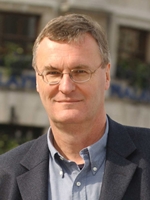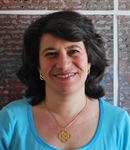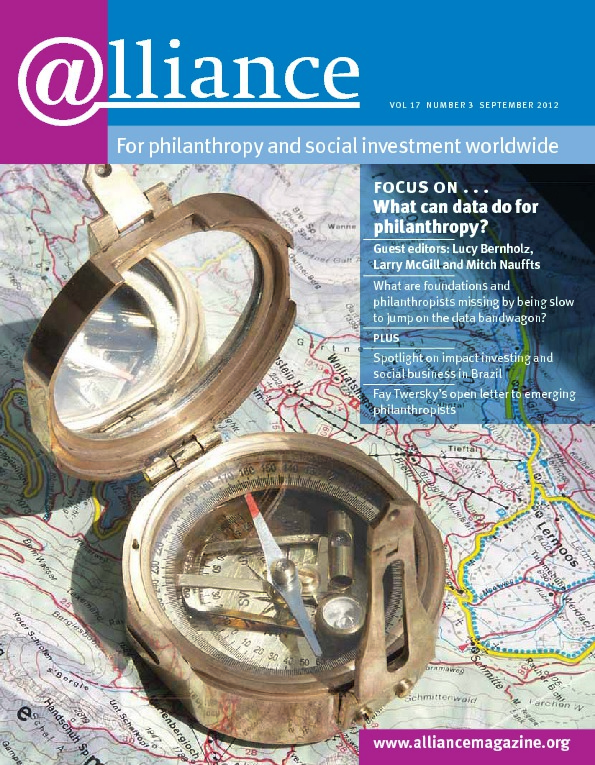Given the volume of discussion and the burgeoning number of approaches to impact and evaluation to increase effectiveness in philanthropy, we would like to step back and ask a fundamental question: should we be focusing primarily on evaluating grantees, as is usually the case, or should we be looking increasingly at philanthropic actors themselves? We believe that we should. What’s more, we believe that this is happening and that, as Charles Keidan of the Pears Foundation suggests in his Latest from Alliance blog on 13 June, foundations are ‘developing a greater appetite for self-questioning’.
 One could even suggest that there is a paradigm shift under way concerning how foundations approach their own practice, which could ultimately make a major difference to their effectiveness, individually and collectively.
One could even suggest that there is a paradigm shift under way concerning how foundations approach their own practice, which could ultimately make a major difference to their effectiveness, individually and collectively.
Increasingly, foundations are asking questions not only about whether they are making a difference but also about which elements of their own practice are most effective. At the same time, they are seeking more actively to learn from peers. They are looking inward at the effect of their own behaviour and looking outward at peers, projects, grantees and a variety of indicators for judging others.
Recent positive indications of some shift in European philanthropy practice emerge from the  Shedding Light on Our Own Practice project [1] in which we set out to explore how foundations carry out assessments of their own organizations – not how they assess their grantees – and looked at how they were using what they learned. We undertook an initial study to identify processes and drivers of self-evaluation and change through a focused set of interviews with 26 foundations across Europe. The sample for this study, which was not intended to be representative, was chosen from a group of foundations already recognized for their commitment and innovation in the learning and assessment fields.
Shedding Light on Our Own Practice project [1] in which we set out to explore how foundations carry out assessments of their own organizations – not how they assess their grantees – and looked at how they were using what they learned. We undertook an initial study to identify processes and drivers of self-evaluation and change through a focused set of interviews with 26 foundations across Europe. The sample for this study, which was not intended to be representative, was chosen from a group of foundations already recognized for their commitment and innovation in the learning and assessment fields.
The results [2] were surprising, encouraging and strikingly diverse. They support the premise that foundation practice does have an impact on the outcomes of their work, particularly when they are seeking transformational change, seeking to change the game.
Based on these findings, the next questions to ask are: how much interest is there in changing the game through changing practice? How much of this is already going on? What works and what does not? And, perhaps most importantly, how can we mobilize interest and support for this important but often neglected element of philanthropy practice?
The study interviewees and a well-attended and lively session at the EFC conference in Belfast in June suggest a strong interest in the topic, but bring to the fore important challenges for the philanthropy learning ecosystem. For example, an important common dilemma raised by foundation leaders is how to foster a learning culture at all levels of staff and leadership (trustees and executives) in their foundations, one that encourages innovation and learning from failure. Another important discussion was whether the most significant issue is how to stimulate critical thinking, not about learning per se; in other words, it is the ability to question above all that is significant.
The fundamental dilemma is: how can European foundations learn from each other and engage in debate on critical issues if they do not know what other foundations are doing and there are so few forums or communities of practice to discuss and share experience among peers? Systematic benchmarking of foundation practice in Europe is lacking and comprehensive data on the philanthropy sector, in general, is inadequate as well.
If we want to change the game, perhaps the essential questions are: why isn’t more attention given and more investment made to address the issues around practice? And what is the cost of non-learning? It underscores a comment made by one attendee in Belfast: the more we know, the more we can get done. We need more opportunities to champion best practices. Drawing on intellectual resources from other walks of life is another useful approach. Developing an increasingly vital community of practice within the sector is key to exploring creative, replicable and scalable solutions. All of these observations call for investment in further investigation and for more critical thinking.
1 Funded by Adessium Foundation, FACT, Fondation Lombard Odier, Oak Foundation and Pears Foundation.
2 Highlights of the study findings are already available. The Shedding Light on our Own Practice project is a collaboration between consultants and funders on the application of learning and research to the practice of philanthropy in Europe.
Judith Symonds, David Carrington and Karen Weisblatt are independent consultants and authors of the upcoming Shedding Light on Our Own Practice report.
For more information
Highlights of the study findings are available at:
http://www.jcsphilanthropy-strategy.com
http://www.davidcarrington.net
http://www.weisblatt-associates.com
The full study will be published later in the autumn.




Comments (0)